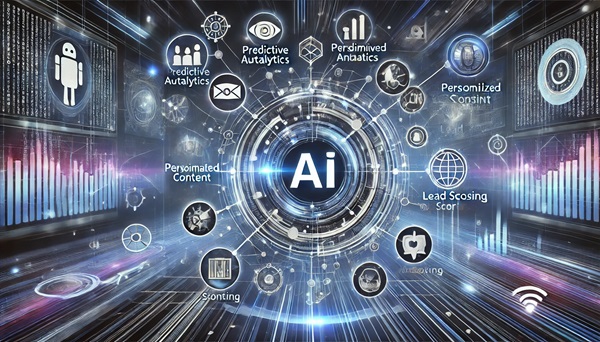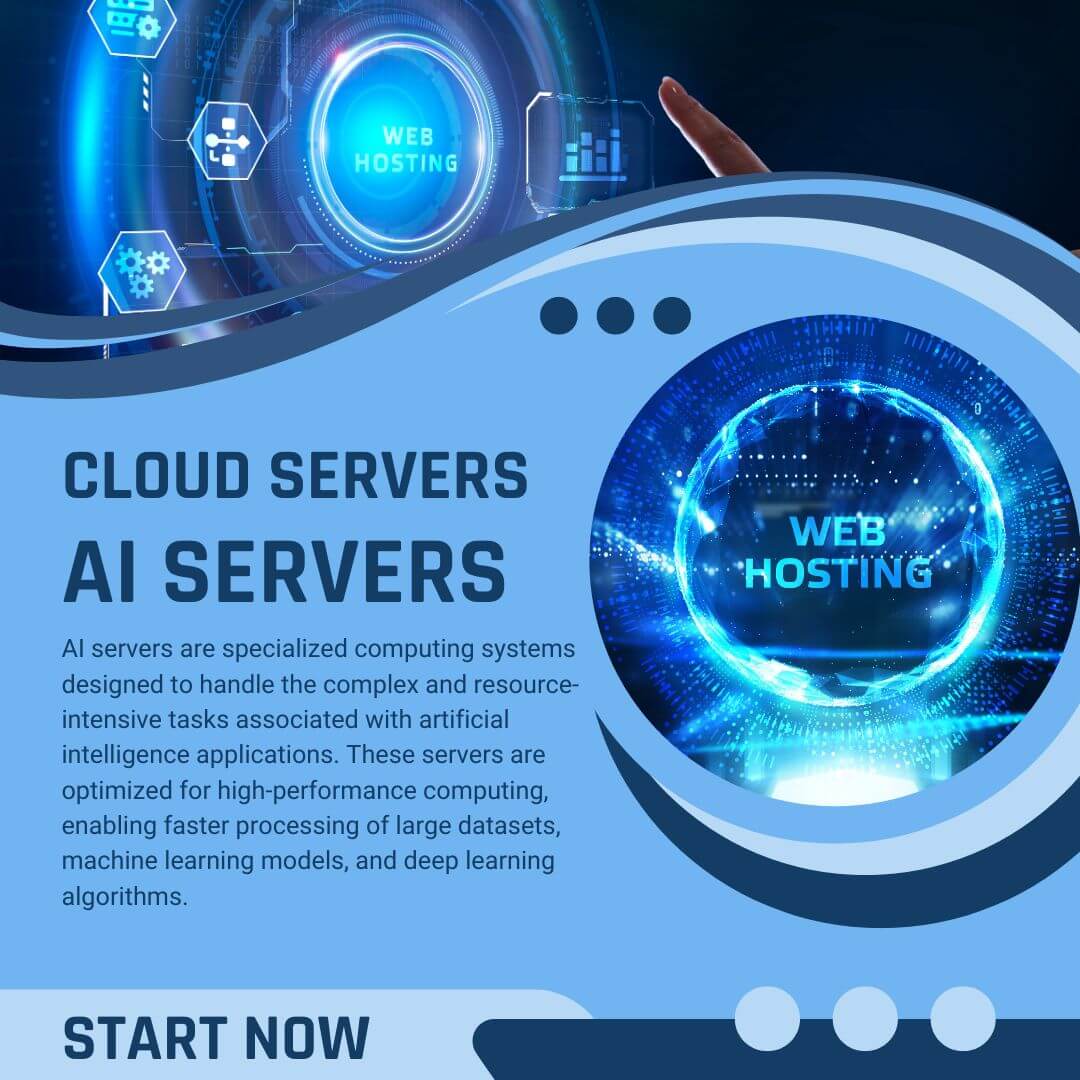In today's fast-paced, technology-driven world, Artificial Intelligence (AI) in Marketing and Sales has emerged as a game-changer. The integration of AI into business strategies is transforming how companies operate, communicate with customers, and sell their products and services. AI’s ability to process large volumes of data, generate insights, and personalize customer experiences is enabling businesses to stay competitive in an ever-evolving marketplace. In this comprehensive guide, we will delve into the numerous applications of AI in marketing and sales, exploring how it can streamline operations, enhance customer engagement, and ultimately drive revenue growth.

AI in Marketing and Sales
Artificial Intelligence refers to the capability of machines to mimic human intelligence, such as learning from data, reasoning, problem-solving, and even understanding language. In the context of marketing and sales, AI helps automate processes, improve decision-making, and offer personalized solutions to customers. AI applications range from predictive analytics to automating repetitive tasks and enhancing customer service experiences. As the demand for real-time responses, data-driven insights, and personalized interactions grows, the role of AI in marketing and sales is becoming increasingly indispensable.
Why AI Matters in Marketing and Sales
The use of AI in marketing and sales has become essential for several reasons:
- AI automates repetitive tasks, saving time and increasing efficiency.
- It provides deeper insights into consumer behavior and preferences.
- AI enables hyper-personalization of marketing campaigns and offers.
- It improves lead generation, lead scoring, and overall sales productivity.
- AI helps businesses adapt to rapid changes in market trends and consumer behavior.
AI Applications in Marketing
AI is reshaping the marketing landscape by providing new ways to understand, engage, and convert customers. From automating content creation to predictive analytics, the use of AI in marketing has revolutionized how campaigns are executed. Below are some of the key areas where AI is making a significant impact in marketing:
1. Predictive Analytics in Marketing
Predictive analytics involves using historical data, machine learning algorithms, and AI to predict future outcomes. In marketing, predictive analytics helps businesses forecast customer behavior, campaign success, and market trends.
Steps in Implementing Predictive Analytics
- Data Collection: Gather historical and real-time data from multiple sources such as customer interactions, social media, and purchasing history.
- Data Cleaning and Preparation: Ensure the data is clean, structured, and ready for analysis. This step involves removing inconsistencies, filling in missing values, and normalizing the data.
- Model Selection: Choose the right AI models and algorithms to analyze the data. This may include machine learning models like regression analysis or neural networks.
- Training the Model: Feed the data into the AI system to train it, allowing the model to recognize patterns and predict future behavior based on past trends.
- Evaluating Accuracy: Continuously monitor the model’s predictions, comparing them with actual outcomes to improve accuracy.
Benefits of Predictive Analytics in Marketing
- Enhanced Decision-Making: AI-driven insights help marketers make data-driven decisions, improving the success rate of campaigns.
- Targeted Campaigns: Predictive analytics enables businesses to target specific customer segments based on their predicted behavior.
- Cost Reduction: By predicting which campaigns will be most effective, businesses can allocate resources efficiently, minimizing waste.
2. AI-Powered Content Creation and Curation
Content is the cornerstone of digital marketing, and AI is transforming how content is created and curated. AI tools can generate, optimize, and distribute content automatically, allowing marketers to focus on strategy rather than execution. Tools like AI copywriters, chatbots, and automated social media posting platforms are reducing manual labor and ensuring that the right content reaches the right audience at the right time.
How AI Enhances Content Creation
- Content Generation: AI tools like GPT-based models can generate articles, blog posts, and product descriptions based on keywords or specific topics.
- Content Optimization: AI analyzes user engagement data to optimize content for SEO and readability.
- Automated Content Distribution: AI automates social media posts and email marketing, ensuring that content is published at optimal times for maximum engagement.
3. Personalization at Scale with AI
Personalization has become a key factor in driving customer engagement. AI enables businesses to offer hyper-personalized experiences by analyzing customer data and behavior in real-time. AI can tailor website content, emails, and product recommendations to individual preferences, creating a more relevant experience for each customer.
Examples of AI-Driven Personalization
- Dynamic Website Content: AI adjusts website content based on a visitor’s past behavior, location, and preferences.
- Email Personalization: AI tailors email marketing campaigns with personalized subject lines, content, and offers based on customer data.
- Product Recommendations: AI algorithms analyze customer behavior to suggest products that they are most likely to purchase.
AI Applications in Sales
Sales teams are increasingly relying on AI to streamline processes, improve lead generation, and close deals faster. AI can automate many time-consuming tasks, such as lead scoring, customer segmentation, and follow-up communications, allowing salespeople to focus on building relationships and closing deals.
4. AI for Lead Scoring and Qualification
Lead scoring is the process of ranking prospects based on their likelihood to convert into customers. AI improves the accuracy of lead scoring by analyzing a wide range of factors, such as engagement with marketing content, past interactions with sales teams, and demographic data. This allows sales teams to focus on high-quality leads, improving conversion rates.
Benefits of AI in Lead Scoring
- Improved Accuracy: AI analyzes more data points than traditional lead scoring methods, resulting in more accurate lead rankings.
- Faster Response Time: AI can instantly score leads, allowing sales teams to engage with high-priority prospects more quickly.
- Data-Driven Insights: AI provides insights into which factors contribute most to lead conversion, helping to refine lead-generation strategies.
5. AI-Driven Sales Forecasting
Sales forecasting is crucial for businesses to plan their resources, manage inventory, and set realistic targets. AI-driven sales forecasting tools analyze historical sales data, market trends, and customer behavior to predict future sales performance. These tools can identify patterns that humans might miss, leading to more accurate forecasts.
How AI Improves Sales Forecasting
- Data Integration: AI can integrate data from multiple sources, including CRM systems, marketing platforms, and social media, to provide a comprehensive view of the sales pipeline.
- Real-Time Adjustments: AI can adjust sales forecasts in real-time based on new data, such as changes in customer behavior or market conditions.
- Actionable Insights: AI tools provide actionable recommendations, such as identifying underperforming products or regions that require more attention.
6. Virtual Sales Assistants and Chatbots
AI-powered virtual sales assistants and chatbots are revolutionizing customer service and sales processes. These tools can engage with customers in real-time, answer common questions, and guide prospects through the sales funnel, all without human intervention. Virtual assistants can also help sales teams by scheduling meetings, sending follow-up emails, and managing CRM systems.
Advantages of Using AI in Sales Assistance
- 24/7 Availability: AI-powered chatbots are available around the clock, providing customers with instant support and improving the overall customer experience.
- Streamlined Sales Processes: Virtual assistants handle repetitive tasks, freeing up sales teams to focus on high-value activities.
- Improved Lead Nurturing: Chatbots can engage with prospects over time, providing personalized information and answering questions as they move through the sales funnel.
AI in Customer Relationship Management (CRM)
Customer Relationship Management (CRM) systems are essential for managing interactions with current and potential customers. AI enhances CRM by automating data entry, providing actionable insights, and predicting customer needs. AI-powered CRM systems can analyze customer interactions and recommend the best actions for sales teams, ensuring a more personalized and effective customer experience.
7. AI-Powered CRM Automation
AI can automate many of the time-consuming tasks associated with CRM, such as data entry, contact management, and lead tracking. This allows sales and marketing teams to focus on building relationships rather than managing data.
Benefits of AI in CRM Automation
- Reduced Manual Entry: AI automatically updates customer information, reducing the time spent on data entry and minimizing errors.
- Improved Lead Management: AI tracks lead interactions and provides real-time updates on their status, ensuring no opportunity is missed.
- Better Customer Insights: AI analyzes customer data to provide insights into behavior, preferences, and potential sales opportunities.
8. Predictive Customer Insights
AI-powered CRM systems use predictive analytics to anticipate customer needs and behaviors. By analyzing past interactions, purchasing history, and demographic information, AI can recommend the best products or services for each customer, increasing the likelihood of conversion.
How Predictive Customer Insights Benefit Sales
- Personalized Customer Engagement: AI provides sales teams with insights into what each customer is likely to need, enabling personalized interactions.
- Increased Customer Retention: By anticipating customer needs, AI helps businesses offer solutions before problems arise, improving customer satisfaction and retention.
- Higher Conversion Rates: AI insights allow sales teams to focus their efforts on the most promising leads, increasing the chances of closing deals.
AI and Marketing Automation
Marketing automation refers to the use of technology to streamline marketing tasks, such as email marketing, social media posting, and campaign tracking. AI takes marketing automation to the next level by enhancing its capabilities, allowing for more sophisticated and personalized marketing efforts.
9. AI-Driven Marketing Automation
AI improves marketing automation by using customer data and behavior analytics to deliver personalized content at the right time. It also optimizes the timing and delivery of marketing messages, ensuring higher engagement rates.
Benefits of AI in Marketing Automation
- Improved Efficiency: AI automates repetitive tasks, such as sending emails and social media posts, allowing marketers to focus on strategy.
- Better Targeting: AI analyzes customer data to target the right audience with personalized content, increasing engagement.
- Real-Time Adjustments: AI can adjust campaigns in real-time based on customer interactions, ensuring optimal performance.
AI and the Future of Sales
As AI continues to evolve, its impact on sales will only increase. AI tools are already improving lead generation, sales forecasting, and customer engagement, and future developments in AI will further enhance these processes. Sales teams that leverage AI will be able to operate more efficiently, close more deals, and build stronger relationships with their customers.
10. AI and Predictive Sales Insights
Predictive analytics driven by AI allows sales teams to anticipate customer needs and preferences. This helps salespeople engage with customers at the right time, with the right message, improving the chances of closing a sale.
How AI Transforms Sales Strategies
- Predicting Customer Needs: AI helps identify customer needs based on past interactions, allowing sales teams to personalize their approach.
- Optimizing Sales Funnels: AI identifies bottlenecks in the sales funnel and suggests improvements to increase conversions.
- Improving Sales Productivity: AI automates administrative tasks, such as scheduling and reporting, giving sales teams more time to focus on selling.
Conclusion
AI is transforming the marketing and sales landscape by providing businesses with the tools they need to succeed in a data-driven world. From predictive analytics to personalized customer experiences, AI is helping businesses understand their customers better, improve their processes, and achieve higher levels of efficiency. As AI technology continues to evolve, its role in marketing and sales will only grow, offering even more innovative solutions for businesses looking to stay ahead of the competition.
References
- The Role of Artificial Intelligence in Marketing and Sales - Forbes
- Artificial Intelligence in Marketing - HubSpot
- How AI Will Transform Sales - McKinsey & Company
- Salesforce Einstein: AI for CRM and Sales
- Artificial Intelligence Insights - Gartner
- Accenture: AI in Business and Marketing
- The Impact of AI in Marketing - Emerj Artificial Intelligence Research
- AI and Automation in Marketing - Cognizant Insights
- How Artificial Intelligence is Changing Sales - Harvard Business Review
- AI in Marketing - Adext Blog








